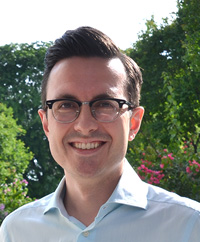About Us Staff Profiles Associate Professor Jonathan E. Ramsay
Associate Professor Jonathan E. Ramsay
- Degree & Masters Courses & Study in Singapore
- Study at JCU
- Global Experience
- Current Students
- Outbound Exchange
-
About Us
- The Singapore campus of James Cook University
- Why Study at James Cook University
- Strategic Direction
- Facts & Figures
- Professional Recognition
- Message from the VC
- Message from the DVC
- Board of Directors
- Advisory Board Members
- Annual Report
- Organisation structure
- Examination board
- Our Quality Management Framework
- Our resources
- Staff Profiles
- Careers
- Tenders
- Research
- Newsroom
- Events
- Applying and Enrolment
- Staff
- Students
- Alumni
- Privacy Policy
- Terms of use
- James Cook University, Singapore Mobile App
- JCUS Student Code of Conduct
- Staff Email
- LearnJCU
- eACCPAY
- Intranet
- Facilities Booking
- ResearchOnline@JCU
- Merit Scholarships
- JCU Graduation
- LearnJCU Help Guides
- 詹姆斯库克大学新加坡校区
- Tropical Futures Institute
- Move-Up Scholarships for Current Students
- JCU Success Workshops
- Annual Report 2020
- Clubs & Societies Redirect
- LC APA 7th Resources Redirect
- Rankings
- Sustainability
- School of Business
- University Pathways Discovery Week
Associate Professor Jonathan E. Ramsay
Associate Professor Jonathan E. Ramsay
Associate Dean, Student Engagement | Associate Professor, Psychology

Qualifications
- Doctor of Philosophy (Psychology), Nanyang Technological University, 2010 – 2014
- Graduate Certificate of Education (Academic Practice), James Cook University, 2018 – 2019
- Bachelor of Arts (Psychology & Physiology), University of Oxford, 2001–2005
Click here for research interest and publications
Biography
Originally from the United Kingdom, Dr Jonathan Ramsay came to Asia in 2009 and is now an Associate Professor of Psychology and Associate Dean for Student Engagement at James Cook University, Singapore. He received a PhD in psychology from Nanyang Technological University in 2014, and a BA in psychology and physiology from the University of Oxford in 2005. Prior to joining JCU he was a Lecturer and then a Senior Lecturer at the Singapore University of Social Sciences (SUSS).
His research interests span areas of personality and social psychology, with a particular emphasis on the psychology of religion and spirituality. His current research projects examine the ways in which religion influences supernatural explanations of events, as well the ways in which scared experiences and their consequences differ across religious, spiritual, and non-religious groups.
Jonathan has published in many international peer-reviewed journals, such as Nature Human Behaviour, the Journal of Personality, Political Psychology, and Psychology of Religion and Spirituality. He is an editorial board member for the Asian Journal of Social Psychology, the International Journal for the Psychology of Religion, and Frontiers in Psychology. He is also the recipient of several internal and external research grants.
Research Interests
- Religion/spirituality, supernatural explanations, and well-being
- Psychological processes in understudied religious and spiritual groups
- Differences in experiences of the sacred across religious and non-religious groups
- Openness to experience, tolerance, and prejudice
- Religious orientations and attitudes to wealth and poverty